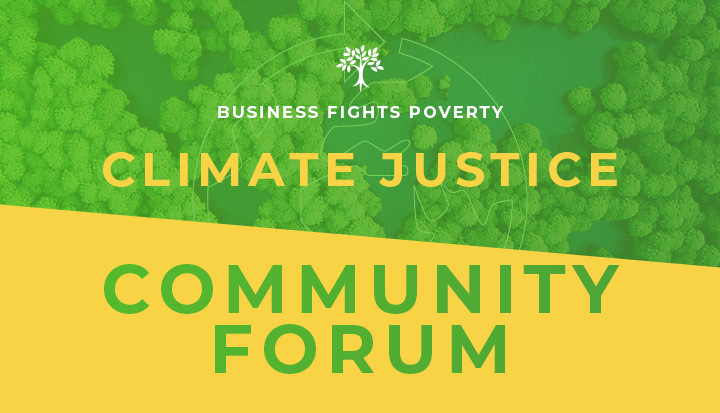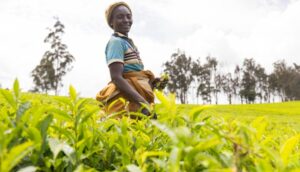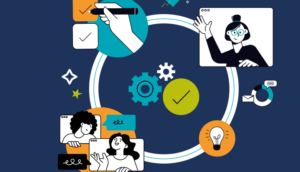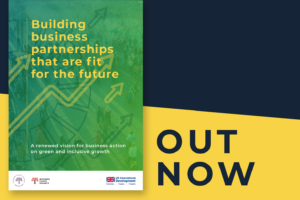A lively online discussion explored some of the themes covered in our report ‘The Role of Business in Education and Training for Sustainable Development”. Contributors to the report joined others from the worlds of business and education to share some deep insights and examples illustrating how collaboration in this area can be taken further.
In the first part of the discussion, contributors explored the broad question of how business should collaborate better with partners to advance education for sustainable development and connect it to job skills and career paths. They shared promising examples of business collaboration with education institutions and other organisations, and sought to highlight the features of these partnerships that make them effective.
Jason Walters at Pearson gave an example of the scale of the opportunity here: “Business can partner with education providers to help students prepare for millions of jobs that are being created by the shift to a low-carbon economy.” Florencia Librizzi of PRME added: “We need to ensure that our graduates are prepared to be part of these ever faster transformation, by having the right set of skills and knowledge both hard and soft. This is essential for the type of innovation required by the SDGs.”
Others agreed, and felt that business should be clear first on its priorities and role in sustainable development, in order to focus on the skills they need for the future in a systematic way. Alison Taylor of BSR wrote: “Once there is a clearer understanding of the skill sets and associated career paths needed over the long term, companies can establish dialogue with academic and training institutions to ensure that the focus of academic course development is these skills – otherwise, the breadth of sustainable development can make it difficult for business to focus.”
Al Rosenbloom from Dominican University said: “There is a growing body of research that confirms what many already know: The CEO and the C-Suite team play a critical role in embedding sustainable development into a firm’s enterprise strategy.” He gave the example of Grupo Familia from Colombia, to illustrate the power that the CEO can have in making sustainable development the “strategic DNA” in a global company.
Daphne Halkias of the International School of Management, Paris, stressed the need to integrate teaching about poverty within business education, with a particular “focus on the mid to small business schools we never hear of – that are educating most of tomorrow’s regional leaders.”
Participants also explored the question “What kinds of training investments work best to deepen employees’ sustainable development skills and knowledge?” Panellists and others wrote about the integration of sustainable development skills and knowledge within other courses, including leadership education. Jason Franz at ASU shared a helpful set of categories for training; each requires different kinds of approach:
- Training sustainability-specific personnel, such as ASU’s Executive Master of Sustainability Leadership;
- Sustainability education for an entire company, such as the Starbucks/ASU Greener Apron program, which aims to help Starbucks’ global workforce become sustainability advocates and change agents;
- Partner education and planning, such as ASU’s Ethical Circular Economy certification workshops.
The discussion moved on to look at what is needed for companies to open up and share more of their internal business learnings on what works and what doesn’t for sustainable development. The conversation explored the issue of trust, and how this can be built up to overcome concerns that sharing this kind of insight may harm a company, particularly where the learning relates to less unsuccessful initiatives.
Alison Taylor commented that “Companies are still very embedded in the idea that CSR is about PR and good news and marketing. But in fact, this framing has the unintended consequence of making the public think it is empty and lacking substance. We need to help create a space for admitting imperfection and shared responses to challenges.” Jason Walters gave examples suggesting that “One way to share challenges and failures can be starting with smaller groups and more controlled programs.”
The discussion concluded by looking at what companies should do differently to highlight the business demand for sustainable development skills and knowledge. Participants agreed that there is unmet business demand for sustainable development skills and knowledge in new and existing employees. They explored what kinds of signals might help educational institutions respond further to the business demand for this kind of education and training. Al Rosenbloom said: “I think the signals from businesses come from the enlightened leader who has a vision yet needs help, support, guidance, training, education to help the firm get there.”
Part of this is also about companies being specific enough: “I just think the demand has to be much, much more specific than ‘sustainable development skills’ as it would not be clear to most people what those are”. Another important step, according to Levan Pangani of oikos international, is that “Employees need to see the sustainable development objectives clearly reflected in their personal targets and rewards. Performance appraisal must take into account the contribution of individuals and teams to longer-term social and environmental goals as well as short-term financial objectives.”
The elements of the discussion highlighted here give only a brief flavour of a really full and deep set of insights. Thank you to all our panellists and others who shared such practical perspectives from their rich experience in widely different contexts. If you would like to read more of the conversation, the full record is online here.










